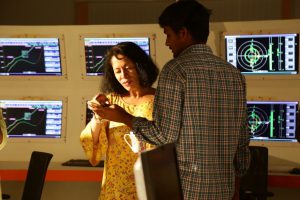Mission Accomplished!
Iconic Hollywood director, Alfred Hitchcock stressed on the absolute importance of a film when he said, “To make a great film you need three things – the script, the script and the script.” But how would you feel when a script that you had shown to potential productions houses gets plagiarised and made into a blockbuster movie featuring top Bollywood actors?
Radha Bharadwaj, a US-based indie film-maker and director of Space MOMs which will be shown at the Sg.SAIFF, met with a similar experience when she went scouting for potential partners in the Indian film industry. While she has been gutsy enough to not only complete the film and showcase it, she is also taken legal recourse by filing a copyright infringement lawsuit against the makers of Mission Mangal, produced by Akshay Kumar featuring Kumar himself alongside Vidya Balan, Sonakshi Sinha and Tapsee Pannu.

Space MOMs is about the women who played key roles in India’s mission of sending a spacecraft to Mars in 2014. The movie was Bharadwaj’s tribute to India and her attempt to show the country in a new light to western audiences who were constantly fed stereotyped images of this country. Coincidently Mission Mangal’s basic storyline also revolved around a similar theme.
Since the matter is sub judice, Bharadwaj refused to comment, but in an interview to The Hindu newspaper last year, she had said, “I parted ways with Atul Kasbekar’s (a well-known photographer) company shortly after I learned that Vidya Balan had read my script. We heard rumours in September that Vidya Balan was going to star in her own film about the women of Mangalyaan. We asked Kasbekar about it but he claimed not to know what the movie was about, even though his team negotiated Balan’s deal. We eventually read about their movie in the press like everyone else.”
Where Mission Mangal boasted of star power, Bharadwaj has chosen to work with theatre artists such as Mahesh Dattani, Bhavna Pani, Swati Das, Pallavi Arun, Pranava Singhal, Jayant Dwarkanath and dancer Ananda Shankar Jayant. Her two previous films, Closet Land and Basil featured some of the big names of the western film industry with the likes of Alan Rickman, Madeleine Stowe, Derek Jacobi, Christian Slater, Jared Leto and Claire Forlani starring in them.
In an exclusive interview to India Se Media, Radha Bharadwaj spoke at length about her latest movie and how this experience has made her a braver director who stands by her vision.
India Se: What prompted you to make the movie Space MOMs? How did you zero in on the subject?
Radha Bharadwaj: On September 24, 2014, India became the first country in the world to put a spacecraft into Mars’s orbit on the first try. By the end of 2014, I was already working on a feature film on the women who had played key roles in that mission. I envisioned my film as a celebration not only of ISRO and its astonishing women—and men—but also of India’s civilisational heritage, which, in my view, has led to this modern-day success.
I had written and directed two feature films starring well-known actors from Hollywood and the UK. Working in the West, I was annoyed at the consistently negative portrayals of India and Indian culture in Western media and entertainment. Of course, this negative view of our country and culture was being copied by some in India.
No country is perfect, but India consistently gets defined solely by her perceived faults. I decided to take action: I would present a positive story about India. In doing so, I wanted to express solidarity with other indigenous cultures that are seizing back their narratives and telling their own stories the way they want to tell them, not the way the colonisers and invaders want to tell them.

India Se: How supportive was ISRO towards this project and did you actually get to meet and interview the featured women scientists who were part of the project?
Radha Bharadwaj: ISRO was very supportive and facilitated interviews with the women and men who worked on the mission. I interviewed several engineers. I’ve stayed in touch with some of them, and have gotten to know other engineers who were in ISRO during Mangalyaan, but who since have moved to the private sector. Regardless of gender or occupation, they share this in common: they are unapologetically, unabashedly proud of their Indian roots.
India Se: Recently Akshay Kumar’s Mission Mangal also dealt with the same subject and it was reported that you too had taken the script to production houses much before his announcement. Do you feel cheated about this Bollywood experience? Did you ever consider legal action? Would you ever work in mainstream Indian cinema after this experience?
Radha Bharadwaj: I cannot comment since my copyright infringement lawsuit against the makers of the second film has been in the court system in India since November 2018. The case is still in process, as we are still waiting for the court to compare the two screenplays. My script was copyrighted in 2016, and I have been working on this film since 2014.
India Se: Mission Mangal boasts of a big star cast and is reported to have raked about Rs 150 crore, do you think this would in any way affect your independent film? Why did you choose not to go with established stars?
Radha Bharadwaj: Again, for the above reasons, I can’t comment on the second film. But I will say that there is a definite and growing demand in India, and amongst expat Indians settled overseas, for an authentic, dignified and heartfelt celebration of the Mangalyaan mission and its engineers. People want to see a film that doesn’t insult their traditions—or their intelligence. Mine is a gutsy indie film that has chosen to make India and the Indian achievement the “stars.” I often say that the “stars” in my film are those in the sky that have inspired our astronomers from Aryabhatta down to today’s ISRO engineers.
India Se: What was the major takeaway for you from this movie-making experience?
Radha Bharadwaj: That when you put your beliefs on the line and are willing to walk your talk, you will be supported in unusual ways. When there was a short-fall in the budget, I mortgaged my house to pay for the film: I didn’t want to risk bringing on a financier who would fight the messages of the film.
I had originally been in discussions with a Bollywood company to produce the film, but the changes they wanted me to make to my script were, in my view, offensive. ISRO and the engineers I had interviewed had asked me not to use real characters with real names. I honoured that request but felt duty-bound to capture the spirit of the real women through my fictionalised characters. The Bollywood company wanted me to go off on elaborate and irrelevant fictional tangents that would have presented these women as being completely different from the real-life women. The women I interviewed had solidly middle-class values and were very proud of their country and their culture. My script depicts the everyday spiritual life of average Indians in a respectful manner. But the Bollywood company didn’t want me to emphasise that. If I had followed their wishes, and added all of these made-up storylines that had nothing to do with the real women, then my film would not really have been a Mangalyaan film.
My film has faced huge obstacles. But I have been buoyed–always–by the support average Indians have shown for this film. I don’t have any publicity budget; I don’t have a major studio pumping money to promote my film. And yet, people are finding the Space MOMs trailer on YouTube, hearing about my fight to make the film, and sending messages of support on social media. People really want to see this film.
India Se: Are you working on any other projects? Could you share some details?
Radha Bharadwaj: I have a film noir thriller set in the US. The film has a very unusual female lead: a middle-aged Indian woman. The script was one of the Feature Access Project honorees; the Project is sponsored by the Writers Guild of America, West.











